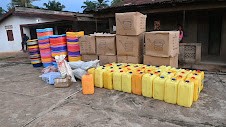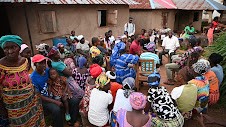The Food and Agriculture Organization of the United Nations (FAO), Iin a bid to combat food insecurity and improve nutrition in Sierra Leone, has taken action to support 1,500 vegetable producers, with a focus on women and youths from 5 districts. The initiative, backed by funding from the Irish government, aims to build resilient communities through climate-smart and market-driven agricultural practices.
Under the project titled “Building Resilient Communities for Improved Food Security,” FAO facilitated access to quality agricultural inputs such as improved vegetable seeds and farming tools. The beneficiaries, who received these essential resources during a distribution ceremony in various districts, were encouraged to make the best use of them to enhance their farming capabilities.
Lansana Vandi, representing FAO in Sierra Leone, emphasized the severity of the food crisis in the country due to factors like extreme climate vulnerability, conflicts between livestock and crop farmers, and rising inflation affecting food and fuel prices. He expressed FAO’s commitment to extending support to more vegetable farmers, especially women and youths, to address these challenges.
The partnership between FAO and the Ministry of Agriculture and Food Security received praise from implementing partners and beneficiaries alike. Mr. Haroun Rashid Kamara, Deputy Director of Extension at the Ministry, highlighted the government’s dedication to making Sierra Leone a food-secure nation and urged beneficiaries to take ownership of the project to maximize its impact.
Mr. Abdulai Kamara, the Project Manager for Sierra Leone Network of the Right to Food (SILNoRF), commended FAO’s unique support in reducing food insecurity and improving nutrition in the country. He foresaw an increase in agricultural projects in Sierra Leone as the government prioritizes agriculture as a flagship program.
With the support of the Irish Government, FAO targeted areas in Bombali, Karene, Port Loko, Moyamba, and Western Rural districts that were most affected by food and nutrition insecurity. Among the 1,500 selected vegetable farmers, 70% were women and youths, forming farmer-based organizations to receive project assistance.
Madam Mariama Seray-Kondeh, a vegetable producer and project beneficiary, expressed gratitude on behalf of the women farmers in Moyamba District. She pledged not to disappoint FAO and its partners and stressed the positive impact the project has had on her livelihood.
Indirectly, the project is expected to benefit approximately 11,445 people, demonstrating its far-reaching effects beyond the immediate beneficiaries. Key government counterparts, including the Ministry of Agriculture and Food Security and the Directorate of Food and Nutrition at the Ministry of Health and Sanitation, collaborated closely with FAO to ensure the project’s success.
By empowering vegetable producers with the necessary resources and knowledge, FAO is taking significant strides in reducing food insecurity and promoting better nutrition in Sierra Leone, ultimately contributing to the country’s overall development and well-being.






